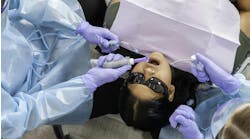If you’ve heard horror stories about DSOs, you’ve probably heard terrible things about patient care—stories about sales quotas, or having to recommend, even force-feed, treatment plans that aren’t in the patient's best interests. Stories about policies that force you into certain treatment plans even if you don’t agree with them. Stories about increasing patient volume so much that you’re down to just seconds to diagnose before moving on to the next operatory.
I’m not going to try to dispute any of those stories. The sad truth is that in older model DSOs, the number one motivator is money. Private equity firms are not invested in patient satisfaction, a high level of patient care, or even employee satisfaction. Their decision making revolves solely around increasing revenue, period.
Where does that leave you? You’ve heard plenty about the financial rewards of joining a DSO, but at what human cost? Are you willing to sacrifice your patients’ health for a nest egg of your own?
Luckily, with the advent of DSO 3.0, financial freedom and elevated patient care don’t have to be mutually exclusive. When you join with other like-minded practice owners to sell as a group to an investor, your collective bargaining power gives you the opportunity to retain clinical autonomy.
With your clinical autonomy intact, you can continue to give your patients the high level of care they deserve, and that you demand of yourself. In fact, with a DSO negotiation done right, your patients will likely never know the difference. They’ll see the same faces they’ve come to know, they’ll continue to get the same care, and they might even see some extra benefits.
How is this possible?
With the business side of the practice off your plate, you can pursue training in other areas of dentistry. Are you interested in the oral-systemic connection? You’ll have the time to become certified in health-saving protocols that connect oral health with systemic diseases such as heart disease, stroke, dementia, and Alzheimer’s.
Maybe you can dig deep into airway treatments or complex cosmetic procedures. Whatever you choose to pursue, you’ll wind up with a double win. Not only are these specialized treatments more profitable for you, but they take your patients’ health to the next level. Their smiles aren’t just brighter, their bodies are healthier.
With your increased revenue, you can reinvest in your practice, purchasing better, cutting-edge technology. Did you have your eye on a new laser? Have you thought about bringing in a CEREC or AI program? Now you can! (With the purchasing power of a DSO, you’ll likely get a better deal on the purchase as well.) Better tech, better diagnoses, better treatment, better health. It’s a cycle that only works to improve your patients’ health.
One final idea: DSO 3.0s don’t have to be just an agreement between a group of practice owners and an investment firm. Some DSO 3.0 groups include practice management consultants or coaches who can work with all the practices in the DSO to improve the group as a whole. These coaches can train teams, create practice and DSO-wide goals, and introduce methodology to improve patient care and case acceptance.
The lynchpin in all this is that you speak up. Find a consultant or broker you trust who can connect you with like-minded DSO groups and then bring your wishes to the table. If you want clinical autonomy, say so. Make it a nonnegotiable item. If the DSO pushes back, walk away.
Above all, remember that you hold the power in negotiations. There are enough DSO groups out there that you can be picky. Don’t sign on the dotted line unless you’re confident that you’re getting what you want. Talk to other doctors who are already in the DSO group. Visit a location. Get a second opinion on the DSO offer. Stick to your demands.
Your patients will thank you.
Editor's note: This article appeared in the April 2024 print edition of Dental Economics magazine. Dentists in North America are eligible for a complimentary print subscription. Sign up here.
Gary Kadi, founder of NextLevel Practice, is on a mission to help dentists beat the odds. While most dentists now don’t retire until age 69, and 96% of them aren’t financially free, Gary has developed the strategies and methods to empower dentists to retire on their terms. The more than 6,000 practices he’s worked with generate over $1 billion in combined collections. Gary has helped them discover true freedom—becoming time-free, debt-free, and frustration-free.








